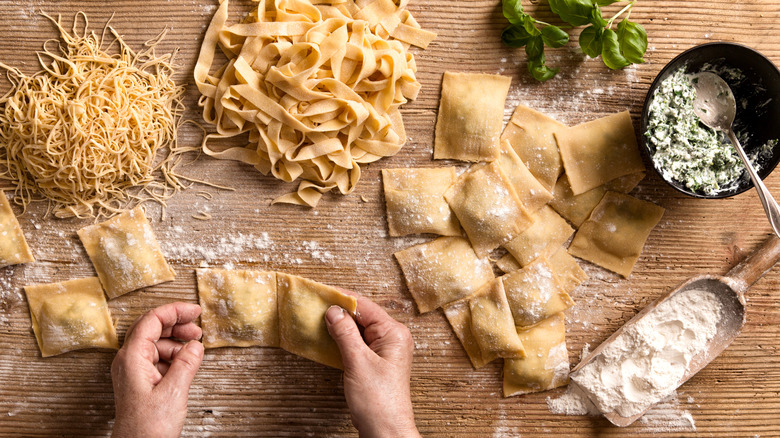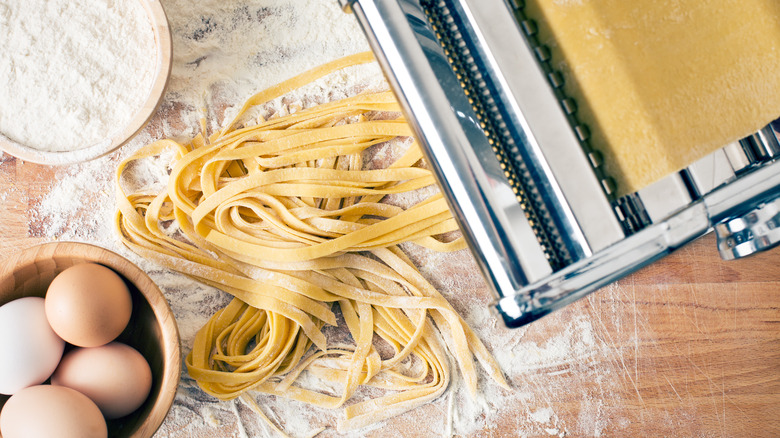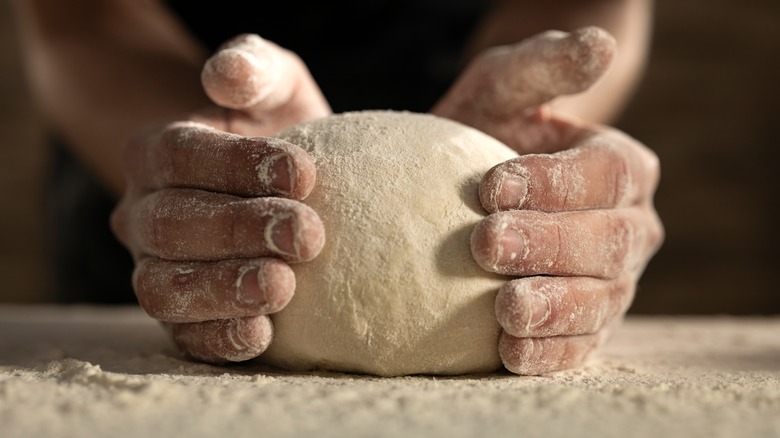The Unrivaled Best Flour For Impressive Homemade Pasta
There are many instances where store-bought pasta comes in handy; it's quick and easy, and if you're cooking a basic weeknight dinner, it gets the job done. But if you have the time to try your hand at some freshly made noodles paired with homemade pasta sauce, you'll find that it's not only simpler than you thought but also tastes fresher, lighter and, well, better. If you're looking for the perfect pasta dough for this homemade dish, look no further than Italian 00 flour.
Chefs across the world prefer this type of flour because of its finely ground texture. It keeps the pasta light, rather than the denser, heavier type you might find in the boxed kind at the grocery store. Many traditional Italian pastas are made with only eggs and flour, or water and flour, and with so few ingredients, quality is paramount. The ultra-fine texture of 00 makes it easy to work with, too. If you're making pasta by hand, it's ideal for smoothly rolling out and shaping the dough.
The science behind 00 flour
The term "00" doesn't actually refer to a specific type of flour. Rather, it reflects the grinding process that flour goes through. Ground flour ranges from 00, meaning the finest grind, all the way up to "2," which is the thickest grind. But the type of flour can vary — semolina, all-purpose, and even whole wheat flour can all be produced in the 00 variety.
Flour contains gluten, which are proteins that help give your favorite spaghetti its texture and toughness. When choosing the right pasta flour, you'll want to go with something that contains enough gluten to develop that stretchy, starchy dough with just the right amount of toughness — and semolina is a great option here because it will give you an ideal texture and feel. Semolina is made with durum wheat, which is a harder flour that contains more gluten than other flour types. It's made of about 13% protein but can sometimes be more, whereas all-purpose flour ranges between 8% to 11%. So, when it comes to the best flour for making pasta, you should look not only for 00 flour but — even more specifically — 00 semolina flour for its two best qualities: The finely ground flour is easy to work with, and the gluten content gives it the perfect stretch and chewiness.
You can still make pasta without 00 flour
00 flour isn't always easy to find; you might stroll the aisles of your local grocery store only to discover that none of the flour is labeled as such. If you have all-purpose flour in your pantry, you can still use it to make decent pasta. It might not be quite as light and stretchy as the 00 type, but it will still have that fresh taste and texture that will beat the store-bought kind.
Celebrity chef Giada De Laurentiis, for example, doesn't require 00 flour for her fresh pasta dough. Rather, she recommends using cake flour, which is low in gluten, paired with standard all-purpose flour; she prefers the lighter texture and starchiness of this combination.
Ultimately, the grind size, plus the gluten or protein content, will make the biggest difference when making homemade pasta, but for ease and price, other flour types that might be coarser or lower in protein will still make that batch of cooked pasta taste better than what comes out of the box. Still, if you can get your hands on some, you'll find that 00 flour is the best choice for making homemade pasta that's bound to leave an impression on your guests.


